- Home
- Andy Remic
A Song for No Man's Land Page 2
A Song for No Man's Land Read online
Page 2
Pausing, he fumbled and found his canteen, wet his lips, wet his throat, and could have wept at the cool relief the water provided.
He moved on. Came round a bend in the trench, watched a man emerge from a narrow connecting gulley, gun ready, his back to Jones, and he glanced towards the retreating figure of Bainbridge. Jones was just about to call out when the uniform registered, the colour leaping from the gloom. The Hun hadn’t heard him, and Jones crept forward, with care, knowing he would have to plunge his bayonet into this man’s back . . . he had to stab another living creature in the back . . . in the back . . .
His rifle was lead. His boots were filled with iron. What I’d give for a sip of whisky, just like in the good old days, he thought, and was almost on the German soldier, and the man must have sensed something, because he began to turn; there were shouts further down the trench but Jones’s attention was focused on nothing else. With a sudden scream he thrust his rifle forward, stabbed his bayonet, but the Hun turned fast, eyes wide, rifle coming up in a gesture of defence as the two rifles smashed together, Jones’s bayonet slicing a thin line up the enemy soldier’s neck, and the Hun cried out, dropping his rifle, hand grasping something at his waist. In a split second, Jones realised this wasn’t a common soldier; the man was an officer, and had a pistol—a Beholla. It came up fast; Jones drew back his rifle for another stab but it was too late . . . time slowed into a rhythmical slow beat, like the ticking of a clock. He could feel cool air around him, the drizzle, hear distant sounds of fighting, guns, the occasional mortar shell screaming through the heavens, the urgent revving of a tank’s engine, and for the first time that day, Jones thought back to home, to Wales, its luscious valleys, its magnificent towering mountains, the bank where he worked with clean paper, cheques, cash, everything clean and free from mud and lice and the smell of oil and death. The whole world seemed to freeze, and he looked into the eyes of the German officer and expected to find hate and loathing and all the other things he had come to expect with his mental image of the Hun. But instead he found only pity, and panic, in those deep brown eyes. Alongside a hard-edged quality, a need to do what needed to be done. In the smallest division of a second Jones found understanding, knew they were the same, this German officer and he. They were men, they were soldiers, and it was soldiers who did the dying.
There was a crack, and the bullet punched up through the German’s throat, exiting high and spinning off over the trench in an exhaust of blood. The body of the officer seemed to fold in on itself, and leant slowly against the trench wall, then slid quietly down into a crumpled heap.
Jones breathed, and glanced up. Bainbridge was pushing another magazine into his SMLE and Jones had no time for gratitude, for relief.
Bainbridge said, “Wondered where the ——ing hell you’d got to! Come on, lad. We’re retreating.”
“But—”
“Hun reinforcements, coming in fast! Now move!”
They climbed out of the trench, up the German ladders, could see other men of the battalion similarly withdrawing and, ducking low, began a haunt-filled sprint to Allied lines. Occasionally, bursts of gunfire made them flinch. Nobody wanted to be shot in the back only a few yards from Allied ground.
Boots hammered on the duckboards behind them in the German communications trench, and Bainbridge and Jones could hear shouts in that harsh, guttural tongue of the Fatherland. There were several cracks and bullets whined nearby, making both Jones and Bainbridge hit the mud hard on their bellies. They crawled along, over corpses, using them as leverage, towards a huge, disintegrated tree now black with the sulphurous burns of the hell in which the Tommies fought.
Rifle shots. Screams. More of the 3rd dead, ejaculated into dreamless darkness. Jones and Bainbridge did not pause until they were past the tree and rolling down into a shell hole, cramped together, slippery fingers reloading rifles, shaking, aware of how close to death they were.
More shouts. Total confusion amidst smoke and noise. The Germans were advancing out of their trench, driving the British and French soldiers back, faces grim, rifles cracking. Heavy machine guns whined and crumps fired, shaking the earth which spat up and out in mushrooms of dirt.
A Hun passed the shell hole, crouched, creeping, and Bainbridge smashed a bullet into the man’s back. Another German passed on the right, stooping to his fallen comrade, turning suddenly as realisation struck him. Jones pulled the trigger, felt the kick of the butt in his shoulder, watched the Hun throw up his arms as if to ward off the blow. The bullet took him low in the stomach and he fell into the mud, screaming at first, the scream turning to a low, drawn-out moan of pitiful pain.
Jones and Bainbridge sat there watching the soldier slowly die. He writhed on the ground, calling for somebody named Eva. His fingers clawed the mud. Bainbridge drew a knife.
“I cannot stand this!”
“Wait,” said Jones. “The bullets . . .”
Bainbridge shrugged off the smaller man’s grip and crawled out from the shell hole. Always a stubborn bastard, thought Jones, and he could see the mud soaking into Bainbridge’s uniform, watched him reach the German soldier and averted eyes as Bainbridge stabbed the man swiftly through the heart.
“It’s quietening down out there,” said Bainbridge on his return. “I think it’ll be safe for us to move soon. Our shells are pounding their trench again.”
“Safe?” Jones laughed. “It’ll never be safe out there. It’s a stiff’s paddock.”
Bainbridge grinned then, his face a shadowed mask in the gloom, helmet lopsided. “Cheer up, lad! We’ll soon be back in the dugout. Think of the bully and the Woodbines! Think of that hearty warm gypo stew in your belly!”
“It’s bullets in my ——ing belly I’m worried about,” muttered Jones.
The two Tommies checked their rifles and prepared to move. Bainbridge had been right; it was quietening down, with the Germans reluctant to advance too far after the fleeing Allies, and with fresh shells howling overhead, pounding their lines. They had regained their communications trench—and that was what mattered.
The attack had been repulsed, with many casualties.
“You ready, lad?”
Jones nodded, and the soldiers crawled on their bellies out into the rain.
The clouds gathered overhead. Heavy rain pounded the mud. Bainbridge and Jones struggled across the churned ground, past a stranded, twisted tank which loomed from the darkened mire like some metal dinosaur, and on, towards the warmth and fellowship of the trench.
The Hun appeared from nowhere, rearing from his hiding place behind a small, crumpled stone wall sporting barbed-wire feathers. His face was a gargoyle, his eyes wide and mad, rifle caked in mud, uniform almost unrecognisable. His rifle thundered and Jones took the bullet, was suddenly punched backwards, swallowed by water filling a shell hole. Bainbridge’s reaction was instantaneous, his own rifle coming about, trigger squeezed, the barrel smoking as its missile hit the German in the throat and took another life.
The German fell back, scrabbling at the wound before slumping onto his side. His eyes glazed. Bainbridge made sure he was dead with a bayonet thrust, then turned his attention to Jones. Jumping down into the rain-filled shell hole, he wiped mud from the younger Tommy’s face and tried to get a response by slapping his cheek. There was nothing. He felt for a pulse, struggling at first but finding it; it was weak and erratic. Bainbridge rummaged around and found the wound high in Jones’s shoulder, and Jones’s eyes flickered open. But he looked past Bainbridge, saw three looming shadows at the edge of the shell hole. They appeared as swirling ink, bulky and threatening and oozing evil.
Look! Jones wanted to scream.
Behind you!
But he could not, and gently his eyes closed again.
“You’ll live, you bastard,” hissed Bainbridge, unaware of the figures behind, and shouldering his rifle, he dragged Jones from the mud and hoisted the man over one shoulder with a grunt. “Now I’ve got to carry you! I’ll want your ——ing W
oodbines for this!”
He staggered through the gloom, past the barbed wire and splintered, bullet-chipped wood.
The three looming dark figures watched him go.
Bainbridge reached the trench and called for help, allowed the scrambling, ducking Tommies to lift Jones from his aching shoulder, allowed his own weary limbs to be assisted into the dark stain of the trench.
“Third Battalion, Royal Welsh Fusiliers,” he managed, coughing heavily and accepting a man’s water canteen. His own had gone dry hours before, leaving his throat tender, his mouth raw.
“Is he dead?” asked a conscript.
Bainbridge fixed him with an iron stare. “Aren’t we all?” he said.
Woodland Dreams.
“Clearwood.”
6th. October 1903.
THE CHILD PUSHED THROUGH the tangle of woodland bracken, stooping below a low branch of ash, then scrambling up an unmarked path between two leaning, ominous oaks, ancient, gnarled, twisted, the whorls on their bark almost like faces . . . with dark knot eyes watching him . . . and then into Clearwood beyond.
He stopped, peered cautiously about himself, and coughing into a balled fist, ran a dirt-smeared hand through damp hair. Sunshine filtered in shafts from high above, but the cold chill of autumn was biting now, and the child was glad of his hat and scarf.
He was panting, chest heaving, but his eyes were bright, and he walked across the small clearing—which he had named the Clearwood. Beyond, over a wall of sprawling bramble with berries bright against dark oval leaves, lay Heartwood . . . and the boy’s ultimate destination.
“This time,” he whispered to himself, wiping sweat from his forehead and stepping forward. There was a cry, and he was startled as a chaffinch flapped from the upper reaches of the woodland with a musical rebuke.
Smiling, breathing deep, the boy approached the bracken which spread out across the sloping hillside. To each side, dense sycamore and maple had found firm footing in the clay soil, and the circle of Clearwood had only one path in . . . and one path out. But he knew the Heartwood lay up ahead, further up the shielded hill; and he knew Heartwood was the one place he had to reach.
Eyes bright, the boy reached the edge of the bracken and began negotiating the dense tangle. Leaves and twigs lay rotting on the ground, filling his nose with an aroma of damp woodland, rotting vegetation, the perfume of the ancient woods, and he pushed himself on over the bracken which snagged at jacket and trousers, as if the woods themselves were trying to pull him back.
The ground steepened and the boy’s breathing became laboured, but he pulled on his gloves and they protected his hands. Thick canvas trousers protected his legs from tree bites.
He pushed on.
Up ahead, he could see it: the summit, Heartwood, populated by a dense copse of silver birch and beech . . . but the sun shone in the boy’s eyes, and he squinted, breath steaming before him, limbs suddenly cold in this place.
The woods whispered, leaves rustling and bracken crunching under his shoes. But the hill had become too steep, the bracken too dense, and he slipped, shoes sliding, and something was in his mind—like a sharp pine splinter—and he felt himself being pushed back, forced back, as if the trees, whispering, chuckling, rejected his intrusion . . .
The boy shouted in surprise as his wet shoe slid, and he was sent rolling back down the hill over bracken and snagging brambles . . . He was dizzy as he came to an abrupt halt in Clearwood, cheek stinging, several coughs hacking from his chest. Putting a gloved finger to his face, he watched a spot of blood soak the fabric.
“Damn!” Frustration, shouted at the trees, which swayed, their branches speaking as if in an ancient woodland tongue.
One day, he would reach the Heartwood.
One day, he would make it past the trees, past the natural defences. It was a child’s game but also a child’s battle. And he would succeed.
In defeat, the boy turned and limped across Clearwood with twigs and leaves stuck to his jacket, a thin trickle of blood running down his cheek. It dripped, and was absorbed into the ancient soil. A connection. A bonding.
He followed the trail from Clearwood, and a bird’s voice rose in song, beautiful and haunting, reminding him of his mother’s voice when she sang gently at their small wooden piano . . . reminding him of his mother’s words, raised suddenly in fervent, glinting anger . . .
Hark! A tumult on the mountains as of a great multitude!
Hark! An uproar of kingdoms, of nations gathering together!
The LORD of Hosts is mustering a host for battle!
They come from a distant land . . .
The boy stopped and blinked, sucking in cool woodland air. He looked around at the bright autumnal colours, absorbing the scene.
A shiver of ice ran down his spine.
What was that feeling?
Then he cocked his head and listened again to the bird song. It had changed from his mother’s angry voice to . . .
The chaffinch?
The boy shrugged, and continued through the dense woodland with the fading song following, unable to explain to himself the absolute total belief that he was being watched by something ancient and evil.
Diary of Robert Jones.
3rd. Battalion Royal Welsh Fusiliers.
16th. September 1916.
I remember no pain. I remember Fritz, with mad eyes, and something extremely strange flickered. His face seemed to twist, the flesh grey and rugged, like tree bark. His limbs were crooked and angular, like the branches of a tree, and it felt like this was a revenge attack by the woods on the murder suffered by our shells. Then he was human, and his rifle thundered, and I was shot and fell into darkness where I swam like a fish in an oil ocean. I had many nightmares, where the Hun forces advanced on our trench, their faces bark, their arms and legs thudding like broken tree boughs. In one nightmare there were three huge, shadowy figures, bulky and uneven. Menace oozed from their distorted shapes as they stood, watching, as helplessly I squirmed. Finally one spoke. He, or it, said, “We’re going to hunt you down.”
When I awoke, Bainbridge was sitting by my bedside, head drooping as his eyes scanned the page of a book.
For a while I lay there, unable to speak, unable to question. I felt tender, as though if I moved, I would crumble into dust. Eventually, I coughed and Bainbridge looked up, his eyes bright, his mouth a crooked smile.
“Jones!”
“How about some whisky?” I’d whispered.
Bainbridge laughed loud and long, which was a surprise because I was expecting the dry rations. He slapped me on the shoulder but saw my face turn white, and he called for the nurse, who was attending to other wounded soldiers in the barracks.
Bainbridge never told me what happened out there in No Man’s Land. He never told me about staggering through the mud with my dead weight across his shoulders. If I questioned him he would shrug, in that noncommittal way he does, and laugh it off. I think he was slightly embarrassed by the attention he received due to the incident. The men said he was a hero, but Bainbridge threatened to punch any man who called him such. I learned what happened from a Tommy, a man we called Soap Brush—because he was always so bloody clean! He must have spent hours scrubbing himself in his dugout.
Bainbridge saved my life. For a long time, I couldn’t understand why he refused to be acknowledged as a hero. But then I realised: how could one man take praise, take the pats on the back and the medals and the bullshit, when so many of his friends were dying out there in the dark? Dying the deaths of heroes? Unrecognised, without praise, dying alone with their legs blown off or their guts spilling out over shrapnel?
Bainbridge was a hero, but he was alive, and for some reason he held this against himself. The true heroes of the war were the men whose songs went unsung, whose lives were extinguished. The ones who died alone.
Part Two
The Ridge
Thiepval Ridge.
27th. September 1916.
SUBSTANTIAL GAINS WER
E made during recent days of fighting, with an average Allied advance of a mile and a half along the whole front. The weather worsened and slowed the advance, and this had been accompanied by German reinforcements, which brought down morale. The villages of Courcelette, Martinpuich, and Flers were successfully taken.
Jones saw active service once more on the Somme with Bainbridge by his side. His wound had been high in the shoulder, damaging muscle and chipping his clavicle, but he was soon fit for battle after a short recuperation period, in which he took as much time as possible to get to know the nurses.
Jones and Bainbridge were like brothers after the Battle of Flers-Courcelette and spent considerable time together, in the trenches, on leave, talking and laughing and experiencing life to the limit, because they both knew their lives could be taken in the blink of an eye. Jones had been lucky at Flers-Courcelette—unlike the other twenty-nine thousand allies who lost their lives.
“What are you doing after, like?” asked Bainbridge.
Jones was lying on his bunk, boots against the wall, staring at the shadows flickering on the wooden ceiling. He pulled a face. “I’ve not really thought about it.”
“Are you going back on the drink?”
Jones smiled. “I think you’ve cured me of that.”
“Better have, lad, or I’ll knock out your teeth!”
There was a comfortable silence for a few moments.
“Do you think my father will ever forgive me?”
“What, for joining up with us normal Tommies?” said Bainbridge. “No, lad. I don’t think he will. He’s an officer, brass; he wanted you, with your fine private education, to follow in his bloody footsteps. A common dog like us? Ha!”
“You reckon he’ll hate me forever?”
“Do you care?”
“Well, sometimes.”
“Well, that’s all arsapeek. Has he ever loved you?”

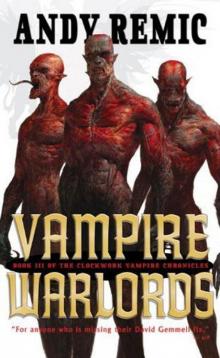 Vampire Warlords: The Clockwork Vampire Chronicles, Book 3
Vampire Warlords: The Clockwork Vampire Chronicles, Book 3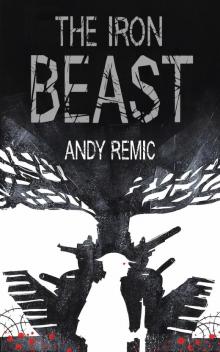 The Iron Beast
The Iron Beast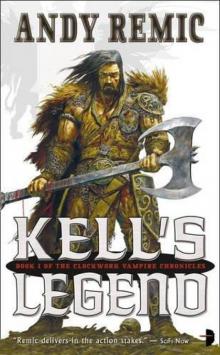 Kell's Legend
Kell's Legend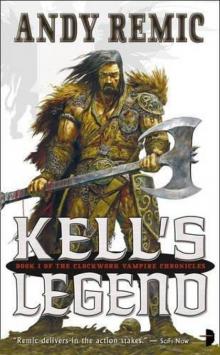 Kell’s Legend cvc-1
Kell’s Legend cvc-1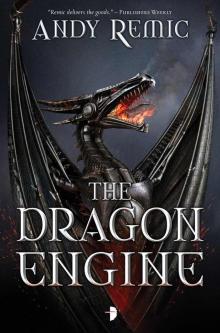 The Dragon Engine
The Dragon Engine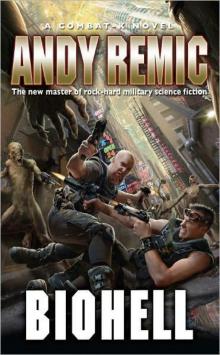 Biohell
Biohell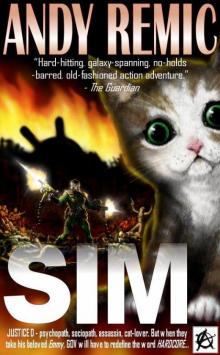 Sim
Sim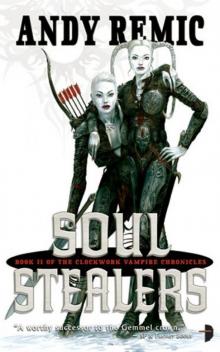 Soul Stealers
Soul Stealers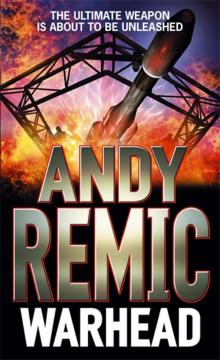 Warhead
Warhead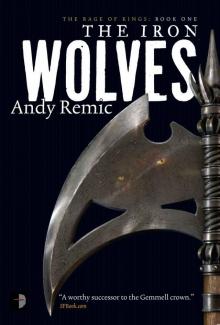 The Iron Wolves
The Iron Wolves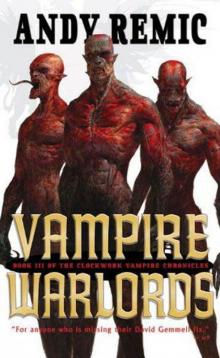 Vampire Warlords cwc-3
Vampire Warlords cwc-3 Serial Killers Incorporated
Serial Killers Incorporated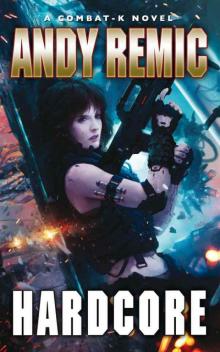 Hardcore - 03
Hardcore - 03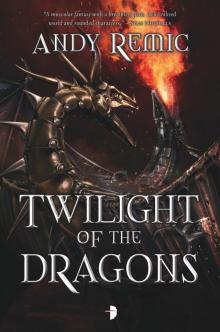 Twilight of the Dragons
Twilight of the Dragons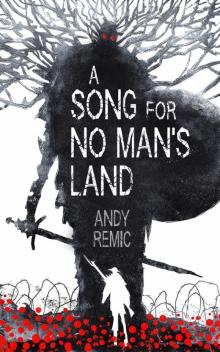 A Song for No Man's Land
A Song for No Man's Land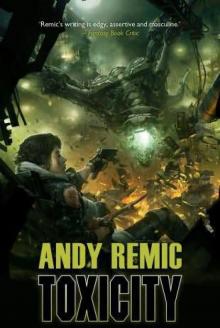 Toxicity
Toxicity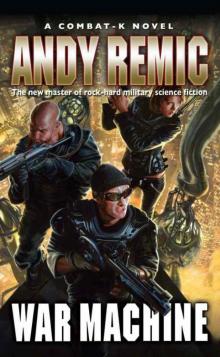 War Machine (The Combat-K Series)
War Machine (The Combat-K Series) The White Towers
The White Towers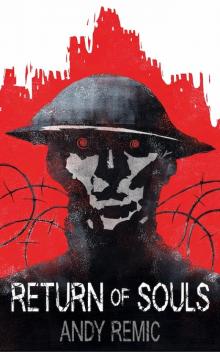 Return of Souls
Return of Souls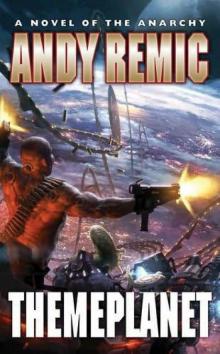 Theme Planet
Theme Planet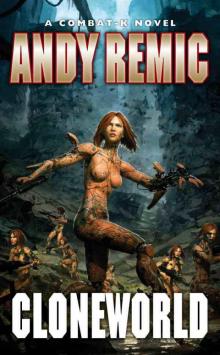 Cloneworld - 04
Cloneworld - 04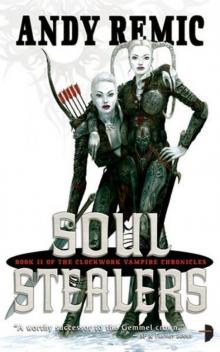 Soul Stealers cvc-2
Soul Stealers cvc-2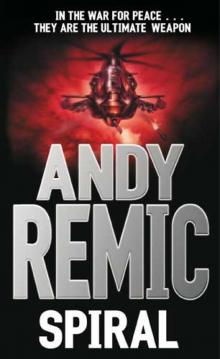 Spiral
Spiral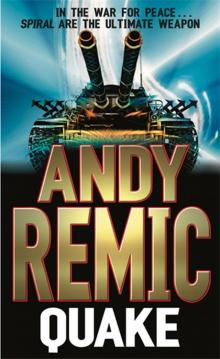 Quake
Quake